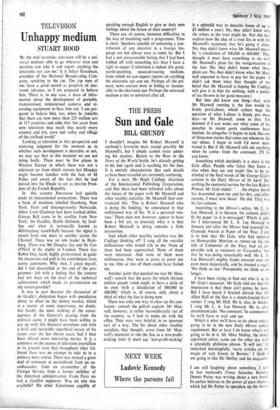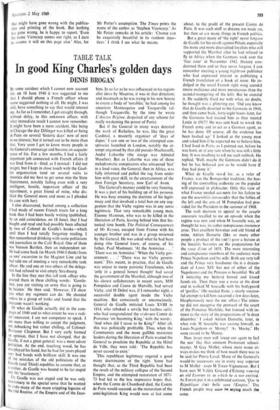Sun and Gale
THE PRESS BILL GRUNDY
I shouldn't imagine Mr Robert Maxwell is anybody's favourite man, except possibly Mr Maxwell's, but I simply cannot resist admir- ing his stamina. Beaten to the floor in the News of the World battle, he's already getting to his feet again and is reaching for the Sun. It is entirely characteristic that such details as have been revealed are extremely confusing.
For a start, Mr Hugh Cudlipp, chairman of the International Publishing Corporation, said that there had been informal talks about the future of the paper with Mr Maxwell and other wealthy socialists. Mr Maxwell then con- tradicted this. `This is Robert Maxwell who is doing the bidding,' he announced in that well-known way of his. 'It is a personal ven- ture.' There does not, however, appear to have been a bid yet, so precisely what it is that Robert Maxwell is doing remains a little mysterious.
And which other wealthy socialists was Mr Cudlipp thinking of? I rang all the socialist millionaires who would talk to me. None of them had been approached. None of them were interested. And none of them were millionaires, they were at pains to point out to me. One or two of them could have fooled me.
Another point that puzzled me was Mr Max- well's remark that the party for which thirteen million people voted ought to have a daily of its own 'with a circulation of 300,000 to • 400,000,' which is, of course, only about a third of what the Sun is doing now.
There was only ,one way to clear up the con- fusion: consult the gallant captain. Mr Max- well, however, is rather inconsiderately out of the country, so I had to make do with his office. They were very helpful, in an ignorant sort of a way. The bit about other wealthy socialists, they thought, arose from Mr Max- well's intention to run the Sun as a non-profit- making trust (I must say • 'non-profit-making'
is a splendid way to describe losses of up to £2 million a year). No, they didn't know who the others in the trust might -be. Nor did they explain how the idea of a trust fits in with Mr Maxwell's statement that he's 'going it alone. No, they didn't know what Mr Maxwell meant by 'a circulation of 300,000 to 400,000.' They thought it must have something -to do. with Mr Maxwell's plans for the reorganisation of the Sun. No, they didn't know what those plans are. No, they didn't know what Mr Max- well expected to have to pay for the paper. (I didn't ask them what they thought of my belief that Mr Maxwell is hoping Mr Cudlipp will give it to -him for nothing, with a packet of tea thrown in for good measure.) 'But they did know one thing—that, with Mr Maxwell running it, the Sun would be firmly pro-Labour, which rathers begs the question of _what Labour is firmly pro these days—or Mr Maxwell, come to that; I'm damned if I can make out what some of his speeches to recent party conferences have implied. So altogether it begins to look like one of those non-stories that come out whenever the sun shines. I begin to wish I'd never men- tioned it. But if Maxwell tells me anything when he comes from the continent, I'll let you know.
Something which decidedly is a story is the Gale affair. People who fancy they know a clue when they see one might like to be re- minded of the final words of Mr George Gale's column in the Daily Mirror of 10 April. De- scribing the memorial service for the late Robert Pitman, Mr Gale ended: `... the elegiac rood has descended upon me and for this, and 'other reasons, I must now desist.' He did. That was his last column.
According to the Mirror's editor, Mr. J. , A. Lee Howard, it is because the column didn't fit the paper `as it is envisaged.' Which is d, for I interviewed Mr L. A. Lee Howaid in January just after the Mirror had received,:the Granada Award as Paper of the Year. j put it to him that Mr Gale, who had received an Honourable Mention as runner-up for the title of Columnist of the Year, had an un- enviable task as successor to 'Cassandra,' but that he was doing remarkably well. Mr L. A. Lee Howard's mighty frame towered over me even more majestically, and he intoned a regal, `We think so too.' Presumably we think so no longer.
I have been trying to find out who is to be Mr Gale's successor. Mr Gale told me that his impression is that there ain't gonna be none. But I have heard it bruited abroad that Mr Allan Hill of the Sun is a much-fancied front runner. I rang Mr Hall. He is, alas, in Alaska. I rang Mr L. A. Lee Howard. He is, alas, incommunicado. `No comment,' he commented. So we'll have to wait and see.
Which is what we'll have to do about what's going to be in the new Daily Mirror colour supplement. But at least I do know what's not going to be in it. Mr Mike Molloy, the newly appointed editor, came out the other day with a splendidly philistine phrase. 'It will not,' he remarked meaningfully, 'carry articles on the magic of rain forests in Borneo.' I think I am going to like Mr Molloy and his magazine.
I am still laughing about something I saw in last weekend's Times Saturday Review. Dennis Potter was writing about a new book. Its author believes in the power of pure chance. which led Mr Potter to speculate on the thing, that might have gone wrong with the publica- tion and printing of the book. But "nothing has gone wrong, he is happy to report 'Even the name Vizinczey comes out right, as I dare to assume it will on this page also.' Alas, for Mr Potter's assumption. The Times prints the name of the author as 'Stephen Vizenczey.' As Mr Potter remarks in his article: 'Chance can be exquisitely beautiful in its random injus- tices.' I think I see what he means.



































 Previous page
Previous page